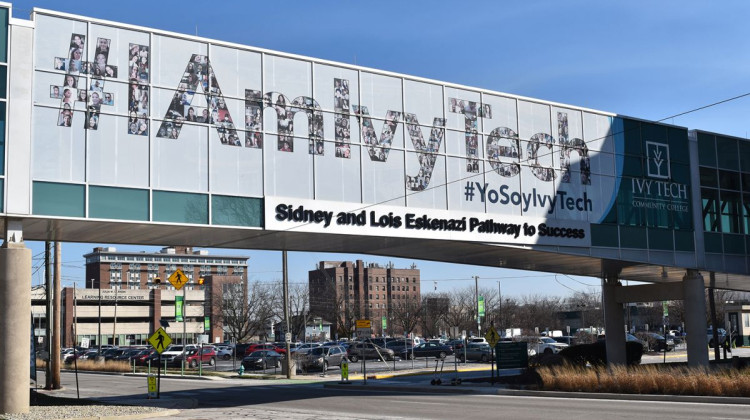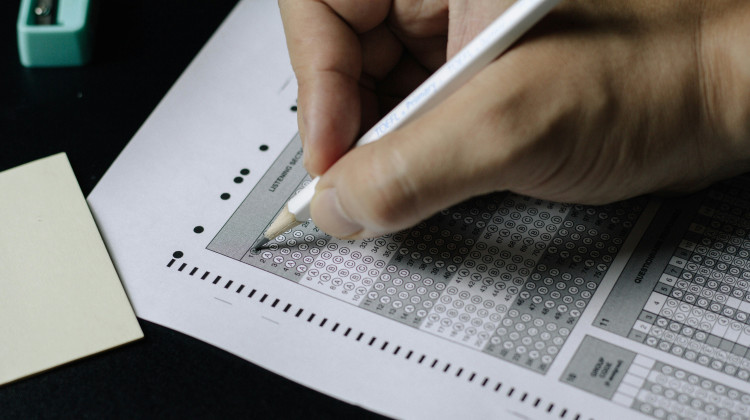Listen: Interview with Republican candidate Mike Braun
Listen: Interview with Democratic candidate Jennifer McCormick
Listen: Interview with Libertarian candidate Donald Rainwater

When Indiana voters head to the ballot box next week, they will select a new governor to take control of the state’s education priorities amid a literacy crisis and high school education reform.
The next governor will oversee a state budget with nearly half the funds directed to K-12 schools, and have the power to appoint – if they choose to do so – a secretary of education who operates the Department of Education and sits on the policy-making State Board of Education.
U.S. Senator Mike Braun – the race’s frontrunner – supports universal vouchers and expanded school choice. The Republican shared some of his plans for the state’s future in education, like the desire to increase teacher pay while reiterating his push for parental involvement in school decisions.
Jennifer McCormick is the former Republican state superintendent of public instruction. She was the last person elected to the role before it became an appointed position in 2021. She then left the GOP for the Democratic party. McCormick’s career is tethered to schools stemming back to her time as an educator.
McCormick’s education plan addresses early childhood education, gaps in learning and more flexibility for K-12 educators to develop curriculum. She wants to raise the minimum teacher salary to $60,000. Currently, state law requires it to be t $40,000.
Libertarian Donald Rainwater called for a change to the state education model that puts more responsibility on local school districts. He also supports universal school choice to create “competition and innovation.”
WFYI spoke to all three candidates for governor and asked questions about everything from early childhood education to leadership of the Department of Education. Listen to each interview here:
Academic accountability
Rainwater favors a decentralized approach that empowers individual school districts and parents to determine the best educational path for their children.
“I think it’s an overreach of the government, to be honest with you,” Rainwater told WFYI about recent proposed changes to high school diplomas. “I believe we need to decentralize education in Indiana.”
He said he doesn’t believe the expenses related to state standardized testing, like ILEARN, are worth it.
McCormick is critical of the state changes in educational standards and assessments, arguing that this inconsistency creates a “moving target” that hinders accurate progress tracking and meaningful accountability.
“So when you aren’t comparing apples to apples, it becomes very problematic,” she said.
McCormick supports a return to a federal accountability system, which she says provides a clearer and more effective framework for addressing achievement disparities than the state-developed system. She blamed the state legislature’s preference for a state-developed accountability system over the federal one for hindering progress in closing racial achievement gaps.
Braun said he wants to restore accountability for student outcomes but has not offered a preferred accountability system.
“That’s going to look like a lot of listening to teachers,” he said, adding that he will be proactive in understanding what goes on in classrooms. “You’ve got to have the right mission plan, the right strategy, but you can’t dismiss the details and how you implement it, and when it comes to how you measure the metrics, that’s important. And I’ll be listening mostly to teachers in terms of what makes sense there.”
Reading
McCormick said it’s not a surprise that third graders are struggling to read. She attributed the decline to multiple factors.
“We’ve created that problem on our own through rhetoric that attacks educators, but also from the lack of funding put in so that we can attract great people and retain them with great salaries and benefits and, you know, good working conditions,” she said.
Rainwater believes the focus on standardized testing is part of the problem.
“What I’m hearing is one of the reasons we’re not doing a very good job is we’re spending too much time and money on standardized testing,” Rainwater said. He supports eliminating standardized tests and simplifying the education system, arguing, “Our money should not be going to all of this other stuff. It should be focusing on teaching the three Rs — reading, writing, and arithmetic.”
In interviews with WFYI, Braun didn’t directly address reading challenges but emphasized the importance of listening to teachers to improve education. He said teachers are underpaid and wants to find sustainable ways to increase their pay.
School choice
Braun supports school choice and competition among different types of schools, describing efforts to suppress alternatives like charter schools as attempts to create an education monopoly. He said parents and students should be “in the driver’s seat.”
Rainwater supports school choice and vouchers, arguing that funding should “follow the child” regardless of economic status. He believes expanding the voucher program would break the cycle of dependency on government in education.
McCormick opposes the expansion of private school vouchers and has raised concerns about charter schools. She argued that voucher programs divert funding away from traditional public schools, comparing it to taking money from state parks to fund country clubs.
Rachel Fradette is the WFYI Statehouse education reporter. Contact Rachel at rfradette@wfyi.org.
 DONATE
DONATE





 Support WFYI. We can't do it without you.
Support WFYI. We can't do it without you.